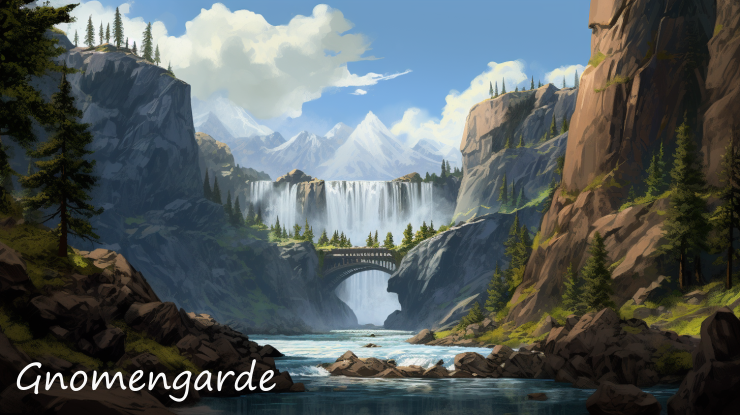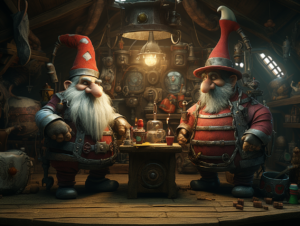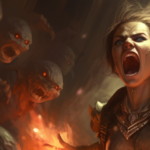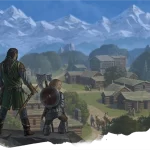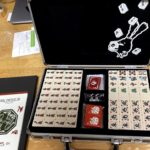Chapter 1: The Dubious Welcome
The Stonehill Inn’s timbers creaked in the gentle embrace of dusk as the four figures emerged into the waning light of Phandalin. Gregory’s towering silhouette cut against the fading sun, his shadow stretching like a prophecy of the battles yet to come. Beside him, Harka Skulltaker strode with the weight of new skulls clinking against her belt, each a grim percussion that marked their return.
The town should have been alight with cheers and the clamor of tankards raised in their honor. Instead, a hush clung to the cobblestones, only the autumn leaves daring to whisper their praise. The windows shuttered, the villagers hid from the dragon’s unseen gaze, and the air carried a tension, as if the very breath of the beast chilled the bones of the townsfolk.
At the heart of this silence stood Harbin Wester’s abode, a structure bloated with the ego of its master, yet quivering with the cowardice that seeped from its cracks. The door remained barred, a wooden sentinel that refused passage.
Gregory’s laughter, a rumble from the depths of his barrel chest, broke the stillness. “I’d rather face the dragon than this silence! Where’s the feasting, the songs? Where’s our welcome?”
Harka’s eyes gleamed, her voice a growl of concurrence. “A skull offered in silence carries less honor. I thirst for a chant, a clamor, anything worthy of Gruumsh’s ears.”
The Bard, never one to be outdone, flourished his lute. “Our deeds demand arias, not this cowardly quietude. If I might parley with this pusillanimous potentate, perhaps our plight would be persuaded to a more pleasing pitch.”
As if on cue, a sliver of movement betrayed the presence of Harbin Wester. A slot at the base of the door slid open, and a single gold coin clinked onto the ground. “Your reward,” came the muffled voice, tinged with the arrogance only a bureaucrat could muster.
The gold continued its slow journey from the safety of Harbin’s hold to the dusty road, each piece a metallic insult to the party’s valor. Gregory snorted with each petty payment, Harka’s scowl deepened, and the Bard’s fingers itched to compose a tune of mockery.
“The dragon terrorizes your town, and this is how you greet its slayers?” the Warlock called out, his voice as cold as the fire in his palm was hot.
Another coin, another sneer. “You are no heroes to me, merely mercenaries. And I have another task for you, scum,” Harbin spat the words like spoiled meat.
The Bard stepped forward, his words a lance aimed at Harbin’s cowardice. “Present thy visage, oh ye of abundant bluster, and we may consider your quest.”
“I shan’t sully myself with your presence,” came the haughty reply. “But you will do as I command, for the safety of Phandalin, for the gold I have so generously bestowed.”
Gregory’s hand rested on the pommel of his axe, the battle-lust clear in his eyes. “A battle is what I crave. If it leads us to the dragon, then so be it.”
Harka nodded, her thoughts drifting to the skulls that might adorn her belt. “And I will collect the skulls that our path yields.”
And so, the Bard, with his honeyed tongue, the Warlock, with his smoldering threat, Gregory, with his impatience for glory, and Harka, with her lust for offerings, wore down the petulant town master’s resistance. A face as red as the setting sun eventually appeared at a crack in the door, begrudgingly granting them passage to Gnomengarde, the land of echoes and invention.
The adventurers turned their backs on the farce, the Bard strumming a tune of reluctant acceptance, the Warlock’s flame extinguished but his ire not, Harka imagining a skull not yet hers, and Gregory eager for the clash of steel and bone. Their footsteps carried them toward Gnomengarde, toward wild magic, and, unknowingly, toward a destiny woven with both valor and vexation.
Chapter 2: The Echoing Madness of Gnomengarde
The adventurers ascended to the cliffside abode of Gnomengarde, its entrance cloaked in the perpetual mist of the waterfall, a kingdom as elusive as the whispers of its unseen inhabitants.
As they approached what seemed to be the main entrance, a disembodied female voice, sharp and quick like the snap of a crossbow, challenged them in a tongue twisted with complex turns and trills. Silence followed, and then a male voice, tinged with paranoia, echoed the challenge in Common. “Leave this place! Lest you wish to become adornments for a mimic’s lair!”
From the mist-shrouded cliffs, Ulla and Pog, the unseen gnome sentinels, kept watch, their presence betrayed only by fleeting shadows and the occasional flash of movement, like figments of the imagination.
The adventurers were undeterred. Gregory’s booming laugh met the challenge. “We seek only to parley, little guardians! We come by the request of your neighbor, Phandalin!”
Harka’s gaze swept the cliffs, her hand resting on the amulet of Gruumsh. “Show yourselves or face the wrath of a war cleric!”
The Bard strummed a chord, his voice a beacon of charm. “Mighty sentries of this fortress arcane, let not our parley be in vain. For songs of valor I shall compose, of guardians bold who faced such foes.”
King Korboz emerged to greet them, a figure shrunken by fear, his crown askew, his eyes darting to the shadows. “Ah, brave… no, foolish travelers,” he chuckled, a sound like the grinding of ill-fitting gears. “You seek aid, but find only peril. The mimic, oh, the mimic! It devours and deceives, a rug it was, but no more. Poor Orrin and Glorin, gone, gone to its endless hunger!”
Loreflower stepped forward, his voice the epitome of calm amidst the king’s ramblings. “Your Majesty, we are versed in many mysteries. Tell us of this mimic, that we might banish it and restore peace to your halls.”
The Bard, too, wove his words with care. “A tale so grim, yet it must be told. For in its telling, we shall find the mimic’s hold.”
King Korboz’s eyes, wild with the echo of his fear, seemed to look through them. “The mimic can be anything, anywhere! Trust not the stone beneath your feet, nor the chair you rest upon!” he wailed, his hands fluttering like captive birds.
It was then he showed them the Barrel Crabs, peculiar contraptions of metal and wood, all gears and levers. They crouched like mechanical arachnids, their claws poised in silent anticipation. The gears within them turned with a rhythmic cadence, a steampunk sonnet to gnomish ingenuity.
Gregory eyed the nearest Barrel Crab with suspicion. “I’m to entrust my fate to this… tinkerer’s fancy?”
King Korboz nodded, his laughter tinged with madness. “Yes, yes! Trust in the craft of Gnomengarde, for only the Barrel Crabs can navigate through the mimic’s lair!”
With a warrior’s resolve, Harka clambered into the cramped quarters of the lead Crab. “This does not frighten me. Let the hunt begin.”
The Warlock studied the mechanisms with a blend of respect and curiosity. “An impressive construct,” he noted, his voice betraying a touch of admiration.
The Bard, ever the orator, proclaimed, “In this mechanical beast, we shall ride, through cavern deep and tunnel wide!”
And so, with Gregory’s bulk squeezing into the first Barrel Crab, and Harka’s form shadowing in the second, they began their journey, the Warlock and Bard walking alongside, their path lit by the faint glow of Loreflower’s arcane fire.
The tunnels of Gnomengarde unfolded before them, a labyrinthine marvel filled with the echo of manic laughter and the lingering dread of the mimic. The adventurers, encased in gnomish marvels and armed with their own unique prowess, delved deeper into the heart of madness, where fear reigned, and where the mimic, that master of deceptive guile, awaited its next performance.
Chapter 3: The Madness of Facktoré
The mechanical legs of the Barrel Crabs clicked a staccato rhythm, a counterpoint to the adventurers’ heartbeats as they delved deeper into the bowels of Gnomengarde. The tunnels, lined with the ingenuity of gnomish hands, led them to the source of an ominous ticking that reverberated through the stone, growing louder with each passing moment.
It was in a chamber of flickering shadows and whirring gears that they encountered the epitome of gnomish madness: Facktoré, her hair a wild mane of untamed ideas, her apron a tapestry of oil stains and scorch marks. She was the conductor of a symphony of destruction, surrounded by her most grandiose creation—the autoloading crossbow defense platform.
The quartet of ballistas, like gargantuan spiders ready to pounce, trained their menacing bolts upon the intruders. At the heart of this mechanical monstrosity sat Facktoré, her hands dancing across levers and buttons with a chaotic grace.
Gregory’s Barrel Crab was the first to breach the threshold, its metallic hide reflecting the glint of impending violence. Facktoré’s shriek, a piercing note of delight and derangement, filled the chamber as she unleashed a hail of bolts. The Crab shuddered under the assault, its armor buckling but holding firm.
The party braced for battle, the metallic taste of adrenaline mingling with the oil-laden air. But before steel could clash or spells could fly, Loreflower, ever the pragmatist, whispered an incantation, his hands weaving the fabric of a Sleep spell.
Facktoré’s glee faltered, her eyes wide with confusion and then heavy with enchantment as slumber claimed her. She slumped in the cockpit, her reign of terror paused by the gentle insistence of the warlock’s magic.
The Bard and the warlock sprang into action, securing ropes around the snoozing inventor, their movements swift and sure. The platform’s mechanisms were stilled, its threat neutralized as easily as snuffing a candle flame.
Harka, with a grunt of disapproval, hoisted the gnome over her shoulder. “No contraption will deter us, nor its creator,” she declared, her gaze hard as the stone around them.
When consciousness returned to Facktoré, her pleas were as wild as her hair. “The crabs! They looked menacing, like ticking bombs of iron and spite! But harm a soul? Never would I!”
Her words found no purchase in the solid wall of Harka’s skepticism. “Your intentions matter not. Your actions speak the louder truth,” the half-orc cleric retorted, her grip on the gnome unyielding.
The Bard prodded gently, his curiosity piqued. “But tell us, what sparked such fear in you, to turn your genius to such ends?”
Loreflower, meanwhile, twirled a flame between his fingers, a reminder of the arcane power at his disposal. The fire danced, casting a glow that flickered like the uncertainty in Facktoré’s eyes.
Gregory, contained no longer within his damaged Crab, flexed his muscles in anticipation. “Enough talk! If there’s no fight to be had here, then lead us to the mimic. My axe thirsts for a true challenge.”
The chamber, once alive with the promise of battle, now lay silent but for the murmur of interrogation and the occasional clang from the Barrel Crabs. The adventurers, their confrontation with madness ended as abruptly as it began, pressed on through the tunnels of Gnomengarde, each with their own thoughts on the encounter—thoughts of war, of truth, and of the ever-looming threat of the mimic that hid in the dark.
Chapter 4: The Wine Cellar Encounter
The adventurers, with the subdued inventor in tow, advanced cautiously into the heart of Gnomengarde’s brewery, a cavernous room lined with massive casks of mushroom wine. The scent was heady, a potent mix of the earthy and the sweet, filling the air with the promise of inebriation and the peril of the unknown.
With the keen sense that any one of these wooden giants could be the mimic they sought, the party tread carefully, their eyes scanning for any telltale sign of the creature’s disguise. The silence was thick, punctuated only by the drip of condensation from the stone ceiling.
Harka’s eyes glittered with a dangerous mirth as she motioned Facktoré forward. “If you will not confess, you shall assist,” she growled, her voice a commanding echo.
Facktoré, her hands trembling, touched the casks under Harka’s watchful gaze. One after another revealed nothing but the rich fragrance of fermenting fungi—until her hand met the cask that did not release her. A guttural sound escaped the gnome as the wood grain of the cask shifted, the mimic revealing itself with a horrid contortion of its form.
Pseudopods lashed out, seeking flesh to bond with, as the mimic shed its cask disguise and went on the attack. The room erupted into chaos, the once silent brewery now a stage for battle, the lighting dancing with the combatants’ movements, throwing grotesque shadows against the walls.
The Bard struck the first blow, his Fire Bolt cutting through the dimness, a streak of orange against the dark wood. “To arms, companions! The foe reveals its treacherous form!”
Loreflower chanted the words to his own spell, the arcane energy coalescing into fiery projectiles that mirrored the Bard’s attack. The warlock’s expression was one of focused calm amidst the frenzy.
“Strike true, and beware its grasp!” he warned, as another bolt of fire sizzled through the air.
Harka, with a primal shout, called upon her deity’s wrath, her hand glowing with the power of Inflict Wounds. Each time her warhammer came down, it stuck for a moment before she wrenched it free, the mimic’s substance clinging like tar.
Gregory, the barbarian, bellowed in rage, hurling javelin after javelin with deadly precision. The thud of the weapons embedding in the mimic’s flesh was a drumbeat to their fervor. “I’ve more where that came from, beast!”
The mimic, undeterred, lashed out with newfound ferocity, a mass of tendrils and teeth. Facktoré, caught in the melee, screamed as the creature turned its wrath upon her. The adventurers fought desperately to save her, but the mimic was relentless.
In a tragic moment, the gnome was consumed, her last cry a haunting echo in the brewery.
The battle raged on, the adventurers’ shouts filling the space as they coordinated their attacks. “Keep it at bay!” Gregory roared, closing in with his greataxe now that his javelins were spent.
Harka, with a fervent invocation, landed a final, crushing blow, her hammer aglow with divine energy. The mimic shuddered and collapsed, its form dissolving into a pool of viscous ooze.
As the creature’s remains settled, two skulls emerged from the slime, Orrin’s and Glorin’s, their sad fates avenged. Harka claimed them solemnly, a cleric’s duty to the fallen.
The room fell silent once more, save for the heavy breathing of the battle-weary adventurers. They stood amidst the aftermath, their shadows long in the flickering light, a tableau of victory and loss. The mimic of Gnomengarde was defeated, but at the cost of the mad inventor who had fallen victim to her own fear. The echoes of the fight would linger in their memories, a testament to their courage and the price of their quest.
Chapter 5: The Kings’ Reward
The chamber of the mimic was left behind, a graveyard of heroic struggle, as the adventurers, their spirits a mix of triumph and trepidation, sought the fruits of their labor. They navigated the labyrinthine tunnels of Gnomengarde, the air still heavy with the unseen weight of recent battle, to the thundering veil of the waterfall that concealed the final test.
Before them lay a treacherous gauntlet: two blades, spinning with a deadly hum, promising a swift end to the unwary. Gregory, muscles tensed, eyes narrowed, gauged the perilous dance of the blades. With a warrior’s resolve, he pressed against the stone wall and let the force of one blade fling him further into the chamber, where he spied the lever of salvation. His hand clasped around it, and with a grunt, he brought the blades to a shuddering halt.
The Bard’s words, a soothing balm, eased the tension as they ventured forth. “Bravery and quick wits are ever the companions of the valiant,” he praised Gregory, his lute quietly underscoring the victory.
The locked room that awaited them held more than treasure; it held the truth of Gnomengarde’s unraveling. King Korboz, once proud ruler, now sat within, a prisoner of his own madness. The Bard, with the gentle coaxing of a practiced storyteller, spun the tale of their encounter with the mimic, of its defeat, and the end of its reign of terror.
Moved by the Bard’s words, King Korboz unlocked the doors, revealing the solemn figure of King Gnerkli, bound not by chains, but by the treachery of glue. His anger was a palpable force, his words sharp as the blades they had just stilled. “Freedom, at last! And you, Korboz, have much to answer for!”
Korboz’s eyes, once wild, now brimmed with sorrow. The sight of Orrin’s and Glorin’s skulls, presented by Harka, was the final blow to his fractured sanity. “My poor, poor gnomes,” he wept, his voice a ghost of its former pomp.
In the silence that followed, the treasures of Gnomengarde were bestowed upon the adventurers. A collapsible pole and a spellbook for the erudite warlock, who ran his fingers over the runes with an appreciative nod. A clockwork amulet, its gears a testament to gnome craftsmanship, went to Gregory, who regarded it with a mix of respect and bemusement.
The wand of pyrotechnics was claimed by the Bard, his eyes alight with the possibilities of such a spectacle at his command. “For performances of a fiery crescendo,” he mused, the potential songs already forming in his mind.
Lastly, a wizard hat, imbued with the essence of Gnomengarde’s magic, was offered to Harka. She accepted it solemnly, a silent vow to honor the fallen with every spell cast.
The party’s mood was a tapestry of emotions—anger at the senseless tragedies, confusion at the madness that had gripped the gnome kings, and a profound sadness for the loss and fear that had so consumed Gnomengarde. Each member of the party carried the weight of these revelations, their triumphs shadowed by the cost at which they had come.
Yet, in the midst of sorrow, there was a glimmer of resolve. They had faced the darkness of the tunnels and emerged into the light, carrying with them not just treasures of craft and arcana, but a story of courage, unity, and the unyielding spirit of adventure.
